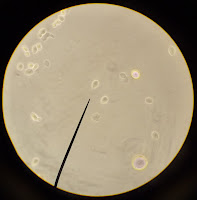1.) Yeast- Heterotrophic, unicellular, have cell wall, oval in shape, reproduce asexually(budding), Class: Ascomycetes

2.) Rhizopus-Heterotrophic, multicellular, aseptate mycelium, sporangiospores, zygospores, Kingdom: Fungi
 - are a filamentous fungus frequently isolated from soil, decaying fruit and vegetables, animal feces, and old bread. They are occasional causes of serious, and often fatal, infections in humans. Certain species are plant pathogens as well.
- are a filamentous fungus frequently isolated from soil, decaying fruit and vegetables, animal feces, and old bread. They are occasional causes of serious, and often fatal, infections in humans. Certain species are plant pathogens as well.
3. Penicillium- Heterotrophic, multicellular, septate mycelium, conidiospores, ascospores, Kingdom: Fungi
4. Aspergillus: Heterotrophic, multicellular, septate mycelium, conidiospores, ascospores, Kingdom: Fungi
4. Chlamydomonas: Autotrophic, unicellular algae, oval and flagellated, Phylum: AlgaeKingdom-Protista.

5. Amoeba: Heterotrophic, unicellular, possess pseudopods, free-living, Class Amoebezoa, Phylum: Protozoa, Kingdon: Protista.

6. Euglena: Autotrophic, unicellular, possess one anterior flagellum, free- living, Class- Euglenozoa, Phylum Protozoa, Kingdon- Protista.

7. Paramecium: Heterotrophic, unicellular, possess cilia all around, free-living, Class- Ciliophora, Phylum- Protozoa, Kingdon- Protista.

8. Trichomonas: Heterotrophic, unicellular, possess 2 flagella, parasitic, cause vaginitis, Class- Archaezoa, Phylum- Protozoa, Kingdon- Protista

9. Trypanosoma: Heterotrophic, unicellular, possess 1-flagellum, parasitic, sleeping sickness, Class- Euglenozoa, Phylum- Protozoa, Kingdon- Protista.

10. Plasmodium: Heterotrophic, unicellular, lack cell wall, non-motile, intracellular parasite (cause of malaria) complex life cycle(definitive host- mosquito- alternate host human), Phylum: Protozoa, Kingdom: Protista

11. Schistosoma: Heterotrophic, multicellular, lack cell wall, flatworm, Adult fluke (head with suckers), Class -Trematode, Phylum-Platyhelminthes, Kingdom- Animalia

12. Taenia: Heterotrophic, multicellular, lack cell wall, scolex (heads) & proglottis (segments) of tapeworm, Phylum-Platyhelminthes, Class- Cestode, Kingdom- Animalia

13. Trichinella: Heterotrophic, multicellular, lack cell wall, roundworm, encysted larvae in muscle tissue, Phylum: Nematoda, Kingdom- Animalia.















This was helpful for my Microbiology test! Thanks.
ReplyDelete